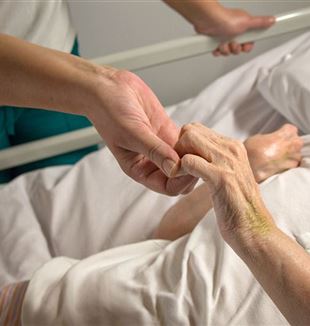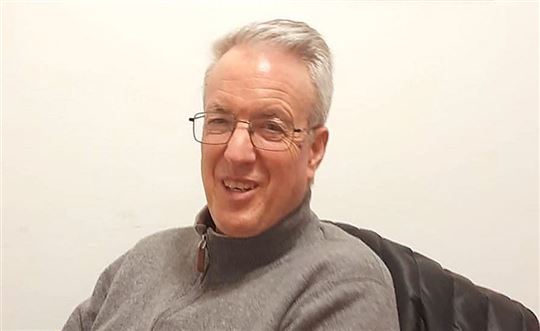
The care for life: Without armor
In the April issue of Traces, Fr. Vincent Nagle, chaplain of the Maddalena Grassi Foundation, shares what he has discovered while accompanying sick patients.The Maddalena Grassi Foundation in Milan is a huge organization that was created to provide in-home care to AIDS patients in the early 90s. Today it has three locations–Vigevano, Seveso, and Concorezzo. In these places, you will find day care centers and communities of psychiatric and AIDS patients, as well as patients in a vegetative state. The foundation provides care for 1,300–1,400 patients (of whom 900 receive home care). These are places where sickness, pain, suffering, and death seem to dominate, where there is no hope for healing. At the same time, when the lives of patients are accompanied, cared for and loved in their most dramatic moments, the most unimaginable surprises are possible. The chaplain of the foundation, Father Vincent Nagle, has attempted to describe these surprises. He is an American priest from San Francisco who belongs to the Priestly Fraternity of the Missionaries of St. Charles Borromeo. Fr. Nagle holds degrees in sociology, classics, and Islamic studies and lived in Africa and the Middle East before being ordained a priest in 1992.
He spends more than ten hours each day talking and listening, going from one place to another in the city of Milan and the surrounding area. He vi sits with patients and their families or friends, accompanying them in whatever capacity they allow. Sometimes they ask him for a particular kind of help–to end their life. These moments spark an agonizing tug-of-war between two freedoms; for example, the one between him and Fabiano Antoniani, known as DJ Fabo, who as a result of an accident became paralyzed and lost his sight. He sought to end his life and was euthanized in 2017. “It was like seeing a man starve in front of a table full of food,” wrote Nagle. In our conversation, we tried to delve deeper into that “table full of food” in order to discover a way to live that, mysteriously, is filled with beauty even in the pain.
Father Vincent, what does it mean to accompany a patient?
For me, over the years, the word companionship has acquired a very important role. There are at least three factors at play. The first: it is necessary to not censor anything. Friends, and often relatives, on behalf of their loved ones, say to me, “Come, so that she can be distracted.” But those who need this distraction more are the loved ones, not the patients, because they are afraid and do not know how to accompany the patients. Without being willing to listen, see, “touch,” everything about a person, the relatives and friends cannot be companions because they cannot stay in front of the person. Can I tell you a story?
Of course.
This year one of my brothers passed away. He spent fourteen months in hospice, and when he entered they gave him six weeks to live. At the end of August, I FaceTimed him, but he was in so much pain, and he was not able to talk that day. He groaned and cried. Every fiber of my being wanted to end the call. It was hard for me to see him suffer, but I stayed on the line. Once in a while I would say something, share a memory or a song… A way to tell him that I was there. After fifteen minutes, which seemed like an eternity, he gained the strength to say, “And God said, ‘I am not finished with you yet.’” It is from a verse in the book of Deuteronomy where God tells the people of Israel that he will not abandon them. To me, that is what it means to be a companion. You cannot alleviate or change the situation, you cannot heal the person, but you are there and the value of simply being present is often underestimated.
So the one who needs to be accompanied first and foremost is the one staying with the patient?
The first step is to admit that you are afraid, that seeing the state that the other person is in is painful to watch, even though you love that person. My experience tells me that, for example, the purpose of assisted suicide is seen as a way not just to alleviate the suffering of the patient, to “free” him from an unbearable suffering, but also that seeing him in that condition is tough on others. In many cases it is done to take away the problem of being responsible for their loved one. It is like saying to the patient, “Here is the solution to your problem. Because you are a problem.” That is why you must not go through this alone, so rather than stop at the pain, you can ask for the courage to stay in front of it and embrace that harsh reality. The second factor at play is that the key to accompanying someone is having a “positive hypothesis.” But when I am with someone who is suffering, I cannot approach the situation with answers. I have to be vulnerable too. I must go to that person and allow myself to feel his or her fear, pain, and panic, but also ask Christ to show himself, and say to him, “Where are you? Come!” 
And what happens?
He comes every time! And always in an unexpected way. God is generous and is willing to work with anyone who asks for his help, even if the question is vague or inarticulate or if you do not even realize that you are asking.
Can you give some examples?
I was visiting a tetraplegic who was very bitter and tired. Every time we met he yelled, “Stop, stop!” We had interesting conversations and sometimes he would be so angry that he would not speak. “I will do it, sooner or later I will do it…,” he said when he talked about committing suicide. But then he caught pneumonia. He asked me to hear his confession and bring him communion. Then he wanted to make amends with his family. He died, I dare say, a holy death, reconciled with God and with all. Let me give you another example. In the last few weeks, I have been visiting this man who is dying and wants to be euthanized. My relationship with him began with an ironic twist: he does not believe in God, but he claims he is not an atheist… He just cannot stand the God of the Bible. One day, we were having a conversation about how, years ago, I had decided that I wanted to abandon any image I had of what my life was supposed to be like and live with the sole desire to see God manifest Himself. I went on and on. Suddenly, he stopped me and said, “I need to go to confession.” Now he looks forward to my visits and is a completely different person. What happened inside his heart? I also think about a 77-year-old woman with ALS who had had a stroke, was divorced, and had two children who refused to help her. She used to be a professor who had been a very active volunteer and was a very positive person… The first time I went to see her, which was four years ago, she showed me the document that gave her the power to request an end to life support at any time. Right away I asked, “Why haven’t you done it yet?” She stayed silent for a long time and then she wrote, “She loves me,” as she directed her gaze to her caregiver. She was her cleaning lady, but when the woman became ill, she decided to devote herself to taking care of her. “I am loved and I am not alone.”
And after that she abandoned the idea of wanting to end her life…
Yes. I can say for a fact that there have been dozens of cases over the years in which people made the decision to be accompanied rather than taking that extreme action. I witnessed people starting to demand the meaning of what was happening to them; they began to open up to a positive impetus, and I saw God at work. Of course, having a living faith is a tremendous advantage. However, there are many Christians who, even though they have a strong faith, seem unable to ask God for this positive hypothesis. How many believers have confided in me, “Father, come on, wouldn’t it just be better to put an end to this suffering?”
Let us go back to the “companionship”–you said there was a third factor…
Before I became the chaplain here, I thought that the elements of Christian companionship were the good, truth, beauty, justice… Beautiful words, which are demonstrated powerfully in a shared life, because of an ideal that is alive among us. Now I realize more and more that at the heart of our companionship there is only one thing: mercy. Everything else comes from that. You can see truth in the flesh when you are not afraid of reality. It is revealed in an encounter without armor, reservations, or doubts, one that is guided by curiosity and the heart rather than fear. But how is this kind of encounter with reality possible? Only through mercy. And what is beauty, if not a collaboration with reality? This is the fruit of mercy.
You also visit patients with mental illness.
At first, the psychiatric patients made me very sad, so closed in their own world… During the first few visits, after spending two or three hours with them, I was worn out. Now, not so much. Staying with them, I came to understand that sooner or later God will show me the person behind the illness. And when that moment comes, and I “see” them, it makes me want to walk with them. They are in their own world and I try to be part of it. I know that God is part of it. Through something that they say or do not say, I realize that they “see” me, and they let me see their “I.”
What goes through your mind when you are about to enter the room of one of your patients?
I do not go in asking myself what I can do. I enter asking, “What will He do?” This reconciles me with reality, not only in front of my patients, but also in my life.